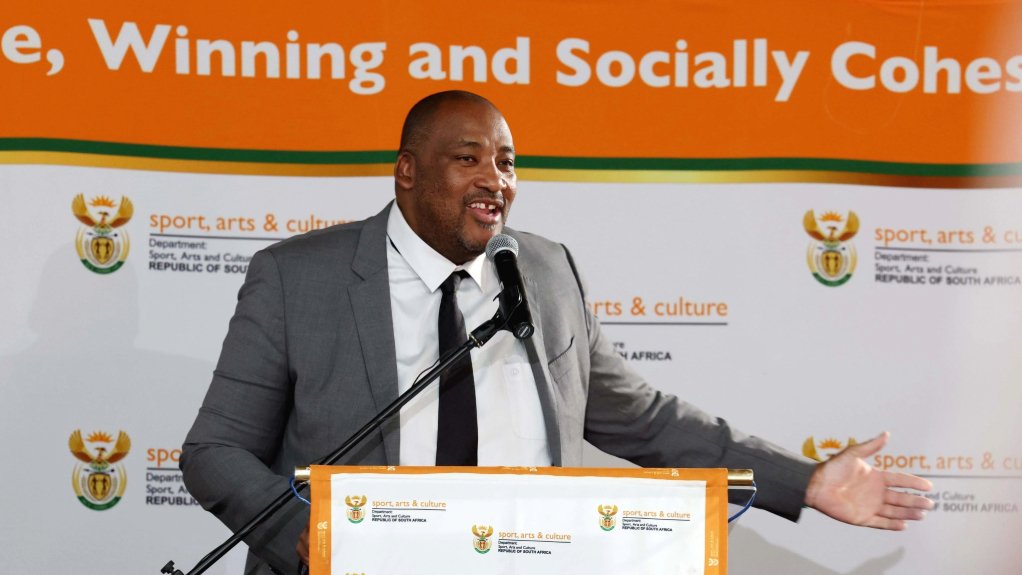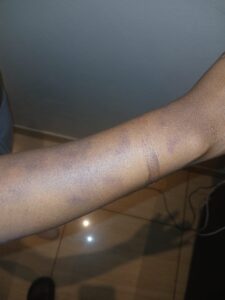By: Gayton McKenzie
The South African Human Rights Commission (SAHRC) opted to make a very public statement last week in which it told South Africa that they had found prima facie evidence against me of “hate speech”. They went further, including in televised interviews, to say that corrective action against me could include me being sent for “diversity and sensitivity training” and a payment to a non-profit organisation as “compensation for harm caused”. This would all be after me being made to issue a public apology acknowledging the “harmful nature” of my remarks, many of which are now nearly 15 years old.
This public statement from the SAHRC was publicised before I had received any letter from the SAHRC, and before anyone from the SAHRC had engaged in any communication with me whatsoever.
I view the SAHRC’s decision to go public with its “evidence” against me of “hate speech” as defamation, because they said these things before giving me a hearing, and without completing even a cursory investigation of any kind. Had they done so, they would have soon realised that they had misunderstood the “evidence” and that suggesting I could produce hate speech of any kind is not legally defensible.
The SAHRC is a Chapter 9 institution, which is meant to uphold the Bill of Rights in South Africa’s Constitution. If the SAHRC had felt the need to make any public statement, which they did not immediately need to do, they could merely have said that they had received complaints against me and would be investigating them. That would have been fair and reasonable.
Instead, they effectively released preliminary findings, even suggesting what the penalties could or should be.
The SAHRC in this way made itself the prosecutor, the judge, the jury, the sentencer and the executioner – all in a single day’s work. What they did not do was make themselves the investigator, because they have investigated nothing, questioned nothing and cross-examined nothing. They have merely taken at face value what social media and rival politicians told them I did.
Without even attempting to speak to me, they were already convinced enough of my evident “hate speech” to go public about it. This is the same organisation that, in 2019, declared that the words “Kill the Boer” do not constitute hate speech. However, they were quick to find hate speech in my tweets.
I had to read in the news about a letter they had supposedly sent me. We eventually found this letter, two to three days after the media furore, in the inbox of an administrative assistant working for one of the senior employees at the Department of Sport, Arts and Culture.
I am not a hard man to find, and my spokesperson’s contact details – just as one example – are contained at the end of dozens of media statements. Had the SAHRC not sent the letter to the assistant of a person reporting to me in my public office, I would have struggled to find it.
This alone has been the cause of unnecessary embarrassment in my working environment.
t pales into insignificance, though, against the public harm the SAHRC has caused me with their public comments.
Since the SAHRC decided to go public with their “case” against me, I am now left with little choice but to go public with this statement now in my defence. I would not have done this if they had decided to rather first give me a fair hearing instead of first playing to the gallery and trying me in the court of public opinion.
If this matter were to go further, to an actual court, where I fully intend to protect my rights, I look forward to embarrassing the SAHRC under cross-examination.
The SAHRC has joined itself to a political campaign against me, led by cowardly anonymous accounts on a social media site, which was then co-opted by the underperforming and strategically directionless political party ActionSA, whose leader, Herman Mashaba, lied to South Africa for years, claiming he would never work with the ANC – and then immediately did exactly that when his voters rejected him.
Mashaba was only too quick to jump on the bandwagon to refer me to the SAHRC because he simply hasn’t forgiven the Patriotic Alliance for outperforming him in the last elections. He must make peace with the fact that it is only going to become worse for him in the next election.
The SAHRC has in this way, and others, allowed itself to be politicised, and to become a political player promoting an anti-Gayton McKenzie smear campaign, when it is meant to be an objective constitutional institution applying the law fairly and equally, above the everyday mudslinging of political contestation.
In the Commission’s ostensible defence of human rights, they conveniently forgot that I, too, am human, and that I, too, have human rights. This includes the most basic principle of natural justice: that the other side of the story should always be heard. This is known in law as the principle of audi alteram partem, which they have not sufficiently observed.
This public statement reflects broadly the same submission that I have delivered to the SAHRC on Wednesday based on their “deadline” to me to respond to them.
Defence to and repudiation of ‘prima facie’ evidence
The SAHRC’s preliminary assessment and prima facie finding of potential violations rely on their interpretation of the Promotion of Equality and Prevention of Unfair Discrimination Act, 2000 (PEPUDA), particularly Sections 7, 10, and 11, concerning unfair discrimination, hate speech, and harassment.
A full review of the context easily reveals, however, that all the posts the SAHRC decided to concentrate on in their letter to me were non-racial in nature, and in fact were intended to challenge and reject racism.
Not one of my tweets have demonstrated any intention to harm, incite harm, or promote hatred, as required under the legal test established in Qwelane v South African Human Rights Commission [2021] ZACC 22.
Instead, they reflect my consistent anti-racist stance. Under South African law, including the Broad-Based Black Economic Empowerment Act, 2003 (B-BBEE Act), I am identified as a black person. The B-BBEE Act defines “black people” as a generic term encompassing Africans, Coloureds, and Indians who are citizens by birth, descent, or naturalisation prior to 27 April 1994, with the subdivision of “coloured” being secondary to this broader classification.
I have also consistently self-identified as a black man, which is in line with my family composition. I attached a 60-page Annexure to my letter to the SAHRC containing screenshots of many tweets that show how I consistently wrote as a black man across all the years I have been on Twitter, now X.
In those tweets I was always advocating for black development, personally, socially, culturally, economically and intellectually. I furthermore consistently wrote against racism and prejudice, and promoted social cohesion and nonracial attitudes, while advocating for personal responsibility for the errors of the past.
I would encourage the SAHRA, and the public, to do a thorough examination of my entire Twitter history to investigate my corpus of public comment to decide for themselves whether, on any kind of genuine balance of probability, I could possibly be a racist.
I am not, and will never be.
I have always fought racism, even when it was not politically convenient to do. After EFF leader Julius Malema said “We are cutting the throat of whiteness” in relation to plans that I had agreed to for removing the then Nelson Mandela Bay mayor, Athol Trollip, I went public and said we would change our stance and rather vote to keep the mayor because we could not support such an expression of racism by Malema.
We have removed senior leaders in the PA for using the K-word in a racist manner. We have zero tolerance for racism directed at any group. Similarly, we did not look kindly on the racism expressed by the Open Chats Podcast. Those podcasters claimed that coloured people are incestuous, inbred, and crazy. If it had been white people saying that about black people, they would have been crucified in the court of public opinion, and the SAHRC would no doubt have sprung into action to ensure they were made to pay.
Those comments were made prior to the furore generated by my detractors finding some of my old tweets. The SAHRC was quick to make “prima facie” judgments on my matter, and even arrive at possible punishments. Yet we are still waiting for them to tell us what they will be doing about the podcasters.
We keep being told that the podcasters are “kids” or “youngsters” as though their age is somehow relevant to matters of prejudice and what is right and wrong. On the contrary, they are not “kids”. They are adults, and they should have known better. Trying to distract from them by making me, somehow, the bigger devil in the drama does not excuse what they said. It doesn’t make it okay, and we continue to watch the SAHRC to see if they can bring the same energy to expressions racism when the perceived victim is a coloured, white or Indian person.
We have been waiting for that, in fact, for years.
Let me point out that in numerous of my historical tweets that the SAHRC has evidently not examined or made reference to, I explicitly stated, among many other things, that I am black and have included myself in the black community. I also once tweeted that racism should be punished by death, a major exaggeration, for dramatic effect – but nevertheless an expression of how hateful I find hate speech and racism.
In my submission to the SAHRC, Annexure 1, a collection of tweets over many years, paints a more complete picture of the man I am and the views I hold. This should help the SAHRC to realise that the selected tweets and a distorted reading of them has completely twisted both my tweets and my intentions with them.
This whole episode has unfortunately also cast a shadow on the South African media. I can think of no journalist from the Fourth Estate who took the time to genuinely examine this apparent furore and cast a light on what the truth might be. Our “journalists” now seem led by whatever the last tweet they read said. They no longer seem to be playing the much-required role of shaping public opinion in line with facts, ethics, calm reasoning and deductive logic. It has been disappointing to witness.
Below I respond to each of the tweets the SAHRC identified in their letter to me as prima facie hate speech.
1 Gandhi Quote (30 June 2013):
The post quoted Mahatma Gandhi’s historical use of the derogatory “k-word”: “A Kaffir sole ambition is 2 collect a certain number of cattle 2 buy a wife with, and then pass his life in indolence and nakedness – Gandhi.” This was not an endorsement of Gandhi, but rather a critical exposure of Gandhi’s documented racist views towards Africans. These are views that are well understood to have developed during Gandhi’s travels in South Africa, and it is documented that his anti-colonial struggle was never waged on behalf of black Africans, but rather Indians alone.
By sharing this quote, I aimed to challenge the idealised image of Gandhi and highlight how even revered figures have perpetuated harm against black dignity. The intent was to educate and stand up against historical racism, not to promote it.
A reasonable interpretation would see this as anti-racist commentary, not hate speech.
What is extraordinary is how few public commentators seem to have acknowledged that the quote in the tweet is a matter of historical record, and that there is documented historical evidence that Gandhi did in fact say these words.
The quote comes from Gandhi’s speech in the city then known as Bombay, on September 26, 1896. It reads, in full, as follows: “Ours is a continual struggle against a degradation sought to be inflicted upon us by the Europeans, who desire to degrade us to the level of the raw Kaffir whose occupation is hunting, and whose sole ambition is to collect a certain number of cattle to buy a wife with and, then, pass his life in indolence and nakedness.”
2 Zuma Criticism Post (27 December 2015):
“The word Zuma replaced the word Kaffir, criticism has reached racist levels, hard 2 distinguish between constructive and malicious critique.” This post defended then President Jacob Zuma, a black leader, against what I perceived as racist attacks against him disguised as political criticism. By equating excessive, unfounded critique to the use of a hateful slur, and even hate speech, I was rejecting racism directed at black South Africans in positions of power. The post promotes non-racialism by calling for fair, constructive engagement rather than malice rooted in racial bias.
3 “@shakier” Reply (30 December 2013):
In response to @shakier’s original post normalising slurs like “kaffir,” “bushy,”and “kuli” as “purely descriptive” within coloured communities, I replied: “Bullshit”. It was the user with the handle @shakier who said “When we coloureds say kaffir, it’s the same as when we call other coloureds bushy’s _ or Indians Kuli. Purely descriptive.” The word ‘Bullshit’ was a direct rejection of @shakier’s claim, emphasising that such language is not harmless or acceptable.
At the time, Twitter’s formatting was different to what it later became, and my reaction to other people’s tweets were not clearly separated. By responding to and repudiating this other person’s highly offensive tweet, I was challenging the casual normalisation of derogatory terms across racial lines, advocating for respect and dignity for all groups – black, coloured, Indian, and others. This was an anti-racist rebuttal, not an affirmation of harm.
4 Whites/Blacks Fire Post (18 August 2011):
“Fuck y’all that says all whites are racist, in the event of a fire there r sum whites I’ll save b4 I save sum blacks!!!!”
This post rejected blanket anti-white racism and generalisations, promoting a non-racial approach where individuals are judged by character, not race. It countered divisive narratives by affirming that worth and humanity transcend racial lines, aligning with constitutional values of equality. It showed that I do not assign value to any human being based solely on what race they may happen to be.
5 Ape-Looking Women Post (12 March 2013):
“That’s not true ‘@AndileGama: @G_XCON zimbabwe, Congo, Kenya, Nigeria!!! All got 75% Ape looking women.’”
My response explicitly rejected the original poster’s dehumanising and racist claim by stating, “That’s not true.” I repeat, and again point out, that the only part of this tweet that I wrote were the words “That’s not true.” The rest was written by @AndileGama.
Again, it seems the SAHRC was rendered confused by Twitter formatting from that time, and they incorrectly concluded that I was the person claiming that women from Zimbabwe, Congo, Kenya and Nigeria look like “apes”. I was not that person. I would never say something like that.
My response to the person who actually said this was a direct stand against harmful stereotypes targeting African women, defending their dignity and rejecting xenophobic or racial tropes. The intent was to dismantle, not propagate, such hatred.
6 Auntie Skin Tone Post (14 December 2011):
“my auntie is very very dark skinned, like navy blue, she dating a bluer guy then her now, i foresee a huge electricity bill, lights always on.”
This was a light-hearted, self-deprecating family joke about skin tone, shared in a personal context without intent to demean. It reflects intra-community humour common in South African coloured families, not colourism or discrimination. I regret if it was misinterpreted, but it was non-racial and aimed at familial bonding, not harm.
7 Zulu Learning Post (15 November 2014):
“Haha ‘@Quibbie_: As a parent I’m already resenting that my daughter is being forced to learn Zulu. I’ll do my best to assist her to reject it.’”
The “Haha”, once again the only part of the tweet that I actually wrote, indicated sarcasm toward the original poster’s resentment, highlighting the absurdity of rejecting Zulu – a black African language – as part of broader language policy debates.
My response was laughing at such attitudes to promote cultural inclusivity and non-racialism – because they are indeed laughable.
8 YouTube Video on Foreign Nationals:
The video called for prioritising South African citizens in employment within DSAC entities, in line with government policies on localisation and addressing unemployment, as well as the Public Service Act, 1994, which reserves permanent state jobs for South African citizens or permanent residents under Section 10(1)(a).
To ensure compliance, we conducted a thorough audit of our department, which was both legal and in line with my responsibilities as a Minister. During this process, no individual was prejudiced or victimised. There was not one instance of anyone being fired or victimised based on their nationality, foreign or otherwise.
We investigated the legality of all hirings, confirming that they had adhered to legal requirements. We challenge anyone to prove otherwise. This approach is a responsible exercise of oversight, not “xenophobic”, as it focuses on legal and economic equity for South Africans facing job scarcity, without breaking any laws or promoting hatred or discrimination under PEPUDA. The allegations in this regard appear paper-thin, as no evidence of victimisation or unlawful conduct has been presented or even alleged.
Conclusion
In summary, the posts that the SAHRC decided to focus on as “prima facie evidence” of hate speech, and which span over a decade, are not only far from being hate speech, but they consistently demonstrate my non-racial ethos: rejecting slurs, challenging stereotypes, defending black dignity, and promoting unity.
They were written in an informal social media environment where robust debate on race is common, and they do not meet PEPUDA’s threshold for hate speech or discrimination, as they lack the requisite intention to harm (per Qwelane).
The Qwelane case should have reminded the SAHRC that in cases where juristic judgment must be brought to bear, it is essential that the background or context be considered to arrive at a fuller understanding of any contested expression.
In the case of my tweets, there was a clear attempt, rather, by both the people driving the political campaign against me and the SAHRC, to see my comments in isolation and in a false light – which disfigured both their meaning and their intent.
Regarding the ongoing accessibility of the online content, I am not averse to deleting any tweets, especially since they appear to be creating much public confusion around their formatting.
On the proposed remedies put forward by the SAHRC, I have already stated that these were arrived at far too prematurely. We should never have arrived at a point where my “punishments” were already being contemplated before I could even be asked for my side of the matter.
I do not believe that the SAHRC’s chairperson, Mr Chris Nissen, held himself up to the high standards expected of someone in his position, and he has unacceptably allowed for the prejudicial weaponisation of the SAHRC under your watch.
The chairperson must be someone of unquestionable integrity, fairness and a grasp of the legal expectations of a body set up to promote the Bill of Rights, including the right to freedom of expression. Mr Nissen is instead allowing the SAHRC to become the Witch-Hunter-in-Chief of South African society and a convenient weapon for politicians who may someday regret this, as the shoe may well be on their foot in future.
This is the last thing we need, and I have appealed to him to urgently change direction on this matter, and for us to find a constructive resolution to it before this matter becomes any uglier than it already is.
If they continue to insist on doing the unthinkable, and taking this matter to court, their case is unwinnable and they will cost the taxpayer unnecessarily to target a man who is incapable of using the K-word against another human being.
If indeed we do find ourselves facing each other in a court, I would relish such an opportunity to clear my name beyond any doubt.
Nevertheless, I still believe this unfortunate episode can be resolved more amicably and sensibly.
Salute.
Ons Baiza Nie.
*McKenzie is Patriotic Alliance President and Minister of Sports, Arts and Culture







